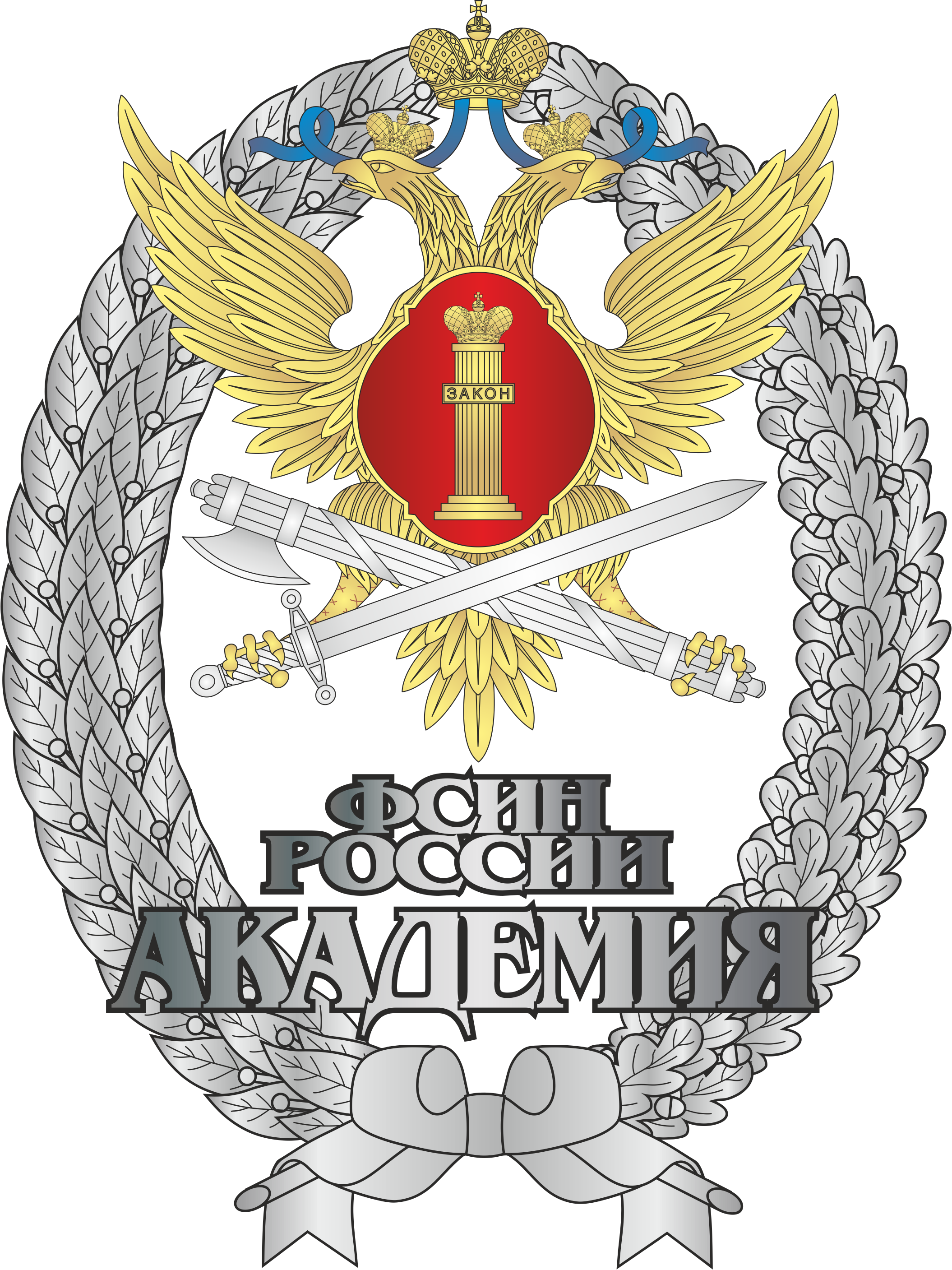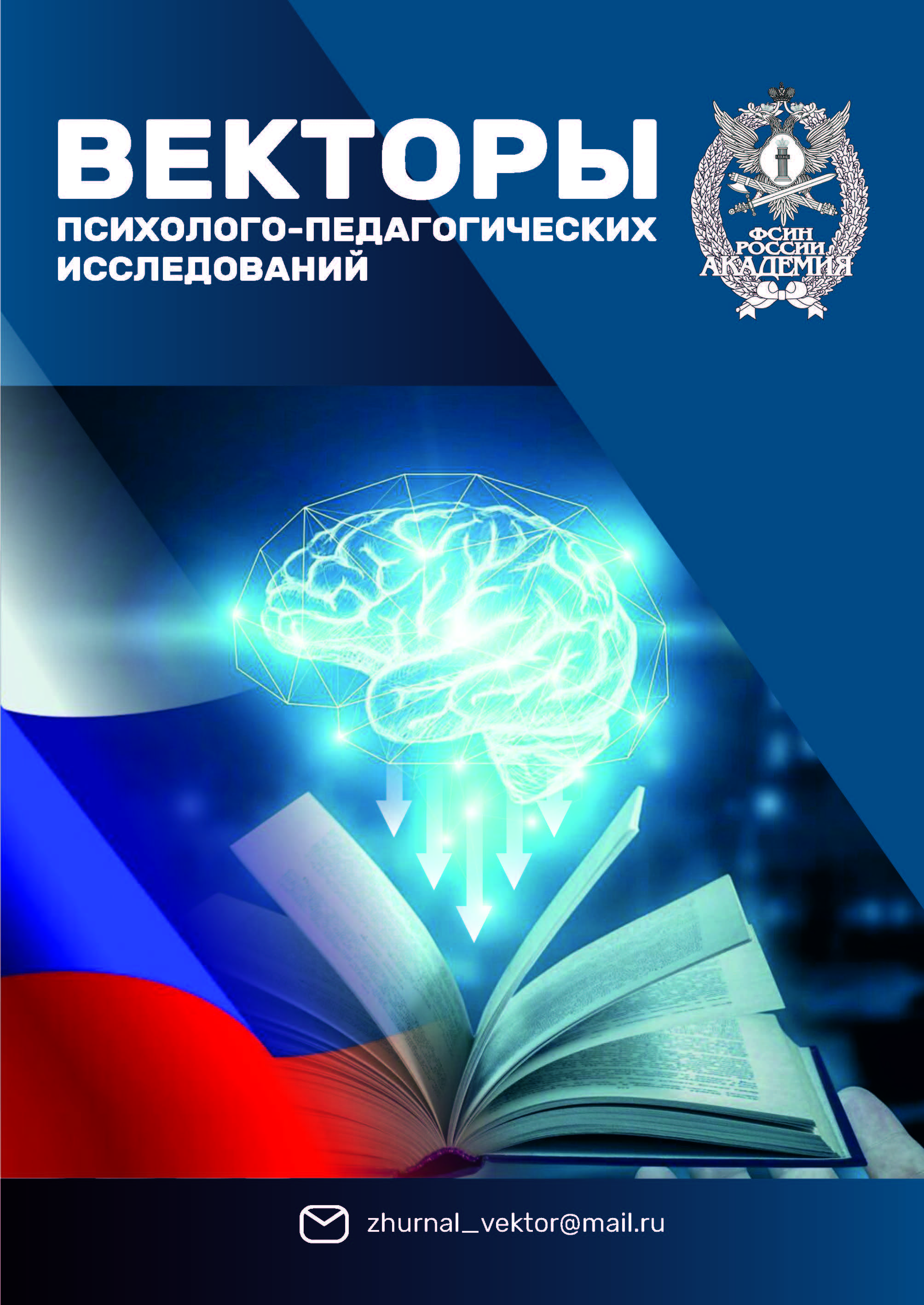from 01.01.2021 until now
Russian Federation
UDC 159.9
UDC 343.8
The article presents the main results of the work of the experimental platform, which operated on the basis of the correctional colony 3 of the Federal Penal Service of Russia in the Ryazan region. Purpose of the experiment was to develop effective methods of correcting the personality of convicted former law enforcement officers as a way of their psychological and pedagogical support. The goal of the experiment was achieved within the framework of the following tasks: psychological diagnosis, psychological prevention, psychological correction, psychological education. As a part of the psychological diagnosis of the personality of convicted former law enforcement officers, different methods were used (survey, analysis of personal files, questionnaire) and methods ("Diagnosis of the motivational structure of personality" by V. M. Milman, "Individual typological questionnaire" by L. N. Sobchik). A psychological examination of 74 persons aged from 22 to 50 years serving their sentences for corruption crimes. The following personality features of convicted former law enforcement officers were revealed: an overestimated level of claims, the need for authority and recognition, an increased desire for official growth, sharpness in behavior with people around them, criticism of the opinion of others, a pronounced desire for open communication and expansion of contacts, sociability, low level of empathy towards others. Psychological prevention was aimed at preventing negative phenomena among convicts (forecasting possible socio-psychological problems that arise in places of detention, creating a favorable psychological climate for correcting convicts, preventing conflict situations). Psychological correction of the personality of convicted former law enforcement officers was carried out taking into account the specifics of a specialized correctional institution and its regime requirements. Psychological correction was aimed at reducing criticality to the opinions of others, reducing harshness in behavior with other convicts, and increasing the level of empathy towards other people. Within the framework of psychological education, the activities were aimed at forming positive attitudes among convicts. The main forms of psychological education were lectures and seminars on corruption, its consequences for society and the economy, discussion of the legal aspects of corruption crimes; the use of information booklets; educational stands.
convicted of corruption crimes, corrupt behavior, experimental platform, correctional institution, psychological diagnostics, psychological prevention, psychological correction, psychological education
1. Ushatikov, A. I. & Ganishina, I. S. 2015, ‘Psychological typology and classification of convicts held in correctional institutions of the penal system of Russia: history and current state’, International Penitentiary Journal, iss. 4, pp. 76–81.
2. Markelova, O. N. 2012, ‘Theoretical and legal foundations of innovative activity in the penal system’, Bulletin of the Perm University. Legal sciences, iss. 3, viewed 12 January 2022, https:// cyberleninka.ru/article/n/teoretiko-pravovye-osnovy-innovatsionnoy-deyatelnosti-v-ugolovno- ispolnitelnoy-sisteme.
3. Ushatikov, A. I. & Ganishina, I. S. 2015, ‘Problems of psychological support of innovative activity in the penal system: a retrospective analysis and the current state’, Applied legal psychology, iss. 4, pp. 38–43.
4. Ganishina, I. S. 2024, ‘On the psychological correction of corrupt behavior of convicts in places of deprivation of liberty’, in V All-Russian Symposium with international participation "Psychology of the XXI century: challenges, searches, vectors of development" (dedicated to the 145th anniversary of the penal system and the 90th anniversary of the Academy of the FPS of Russia): collection of materials (Ryazan, April 11–12, 2024), pp. 432–437, Academy of the FPS of Russia, Ryazan.
5. Ganishina, I. S. & Guseva, A. S. 2022, ‘On the issue of studying the motivational sphere of those convicted of corruption crimes’, Bulletin of the Samara Law Institute, iss. 2(48), pp. 93–100.
6. Ganishina, I. S. & Guseva, A. S. 2021, ‘Corrupt behavior of law enforcement officers: a theoretical analysis of the problem’, Psychology and pedagogy of official activity, iss. 4, pp. 34–38.
7. Ganishina, I. S. & Guseva, A. S. 2022, ‘Features of psychological and pedagogical support for those convicted of corruption crimes’, in XVI International scientific and practical conference "Anthropocentric sciences in education": collection of materials, pp. 224–228, Scientific Book, Voronezh.
8. Ganishina, I. S. 2023, Psychological, educational and social work with those convicted of corruption crimes: monograph, pp. 243–253, Scientific Book, Voronezh.
9. Khanakhmedova, L. V., Danilova, I. Yu. & Machkasov, A. I. 2014, Psychological and pedagogical support of those convicted of corruption crimes: textbook, Moscow University of the Ministry of Internal Affairs of the Russian Federation named after V. Ya. Kikot, Ryazan.
10. Guseva, A. S. 2023, ‘On psychological work with those convicted of corruption crimes’, in The penitentiary system of Russia in modern conditions of society development: from the paradigm of punishment to correction and re-socialization: collection of materials of the scientific and practical conference, in 3 vols, vol. 3, pp. 156–160, Vologda.
11. Sochivko, D. V., Ganishina, I. S. & Maryin, M. I. 2020, ‘Psychological characteristics of corrupt criminals serving sentences in places of imprisonment’, Psychology and Law, vol. 10, iss. 3, pp. 5–19.
12. Ganishina, I. S. 2014, ‘The program of psychological education as a means of preventing drug addiction of convicts’, Applied legal psychology, iss. 3, pp. 53–60.
13. Ushatikov, A. I. & Ganishina, I. S. 2015, ‘Personality of a drug-addicted convict and its features’, Man: crime and punishment, iss. 3(90), pp. 194–197.
14. Detkov, A. P. 2011, ‘Organization and conduct of psychological work with convicts, anticipating destructive processes in places of deprivation of liberty’, Society and law, iss. 1(33), pp. 134–138.









